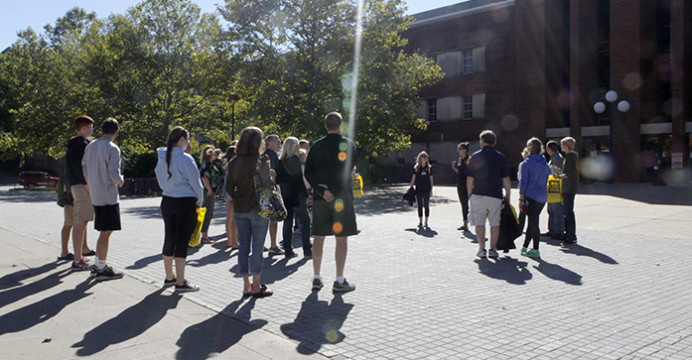
By Hannah Adamson, The Daily Iowan
Throughout this summer, the University of Iowa Student Government has pushed for funding for cultural centers across campus as well as mental-health services, including adding four new counselors to the University Counseling Service.
Also part of its action on mental health, UISG is working on a peer counseling program that stems from UISG President Rachel Zuckerman’s experiences as a resident assistant in the dormitories.
“We want to emphasize productivity,” she said. “We want to do more than talk about issues. In May, when our year is over, we want students to see what we’ve done and see how we’ve improved.”
UISG officials also proposed ideas to create a more welcoming environment for international students. One initiative is a campaign against hatred on the social-media app Yik-Yak. It asks students to “down-vote” demeaning comments, specifically comments targeted against international students.
Zuckerman and other student leaders also recognized that, in years past, domestic students went through a campus tour as part of their Orientation, while international students did not have the same access. Because of this, they said, the UI failed to both familiarize international students with the campus right away and address the challenge of language barriers. As a result, international students encountered problems upon arrival.
Zuckerman said language barriers can make international students feel extremely self-conscious and less likely to get involved on campus.
“We’ve institutionally segregated them from Day 1,” she said.
In response, UISG proposed campus tours for international students, an idea that has come to fruition.
Starting this year, international students will go through campus tours as part of their Orientation, and domestic students will volunteer as tour guides.
Another issue UISG decided to tackle is a lack of voting among students. UISG Speaker of the Senate Titus Hou said only around 20 percent of U.S. citizens between the ages or 18 and 29 vote.
“[Big Ten universities] end up accounting for half a million students,” Hou said. “It’s a very large voting bloc that needs to get organized and get engaged.”
At the most recent Association of Big Ten Students Conference, at Penn State on July 30, UISG proposed a Big Ten Voter Registration Competition that would start this fall.
The goal is to register as many student voters in Big Ten universities as possible by staffing tables throughout various locations on campuses such as resident halls and fraternities and sororities.
UISG Vice President Lauren Freeman said it is crucial that more students get engaged in the upcoming presidential election, and UISG can help facilitate that.
“It’s a two-step process; first registering them to vote but also explaining and encouraging them to vote,” Freeman said.
The idea behind the competition is to rally several different political organizations on campus in order to plan when and where each group will staff tables. That way, each political organization that wants to be a part of the process can have its voice heard and encourage more students to consider the separate platforms.
During the competition, Zuckerman said she hopes students will see the ballot box as an effective way to bring about change.
“Until we have young people voting in a way that they become an electoral force, it’s hard for us to make a significant impact on legislative issues,” she said.
The recent UISG initiatives and ones to come in the early fall are only a part of what Zuckerman and Freeman say UISG will strive to accomplish this year.
“It’s a slow-moving machine, but we know the conversations we’re having will benefit future students,” Zuckerman said.